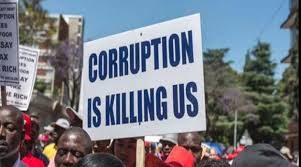
By Dele Bello-Williams
Corruption is an all too visible aspect of African politics, manifesting itself in a series of high profile scandals across the continent’s recent history. Mobutu Sese Seko, the former autocrat of The Democratic Republic of Congo (then Zaire), acquired a considerable personal fortune of at least $5 billion whilst in power; this was an amount equal to the country’s whole external debt at the time of Mobutu’s ousting in 1997 (Svensson, 2005). A further example is the extensive corruption spearheaded by Daniel Arap Moi of Kenya, causing millions of dollars of public money to be lost in “enormous cash subsidies for non-existing exports of gold and diamonds” in the Goldenberg saga. Even in recent years, corruption has continued to plague the African continent; recent investigations into Isabel Dos Santos reveal this. Although corruption is a criminal offense in the legal codes of almost every African country, enforcement of such laws has been anaemic, across the continent. Africa’s leaders (especially those under allegations of corruption themselves) are eager to portray themselves as anticorruption crusaders whilst taking little meaningful action to combat the practice.
Need for a deeper understanding of African socio-cultural dynamics
Africa’s vast cultural diversity has been perceived as a limitation to development and a catalyst for corruption. It’s influence, even in the modern age, has been the topic of discussion for myriad Western journalists and scholars. Yet few have considered African perspectives in their discussion of corruption in Africa. By examining the idiosyncrasies of corruption on the continent, it will enable political and thought leaders to identify the root causes, giving future anticorruption efforts a far greater opportunity to succeed.
To better understand, and thus combat, corruption in Africa, it is critical to include perspectives and discourses from the continent’s own scholars, instead of exclusively relying upon definitions originating from the West. The Nigerian sociologist Peter Ekeh, for example, argued an understanding of the colonial past of much of Africa is a critical factor in understanding contemporary political situations on the continent (Ekeh, 1975). Factors such as rapid decolonisation (and subsequent lack of appropriate mechanisms of bureaucracy and administration) are critical to understanding why corruption exists in Africa today. In the Western world, where strong central governments have administered the same area for centuries, this is a non-factor, with this being reflected in corruption literature originating from the West.
The Patronage System
The blending of the public and the private through patronage structures is certainly not a strictly African affair. In Western societies, personal relations play a crucial role in the management of public affairs and administrative-institutional rules, in concert with existing governmental structures. Nonetheless, the intensity, relevance and impacts of these privatization processes are much greater in the African context. The privatization of public institutions has become a critical component in politics at a local level with severe developmental effects. Neo-patrimonialism and patronage structures exert significant influence on the behaviors and perceptions of citizens regarding services provided by the state (Pitcher, Moran and Johnston, 2009). The service-providing role of the country is perceived as being strongly privatized as the people in authority are seen to have taken charge of the service-provision activities of the state.
Within formal state organizations, there exists an informal ideology of rivaling political camps and their subsequent associations of political patronage. This ideology is in constant conflict with non-partisan bureaucracy. Political patronage enables politicians across Africa to tighten their grip on their positions, especially at the presidential level (Van de Walle, 2005). In turn, these practices influence on political values of the local population, facilitating the development of clientelism within state structures. This informal rationality of rivaling political camps using patronage networks should not automatically be considered as a negative and unproductive attribute of African politics. On the contrary, it is a critical process in the continuing evolution of democracy on the continent, given its catalysis of greater development of marginalized regions and minority communities through their political representatives and advocates. Although malign forms of corruption (especially state capture) are prevalent in African politics, it is important to consider the idea that patronage networks, which would be summarily classified as corruption in the West, are an important step in Africa’s democratic growth.
References:
- Peter P. Ekeh (1975) “Colonialism and the Two Publics in Africa: A Theoretical Statement.” Comparative Studies in Society and History, 17:91-112.
- Anne Pitcher, Mary H. Moran and Michael Johnston (2005) “Rethinking Patrimonialism and Neopatrimonialism in Africa.” African Studies Review, 52:125-156
- Jakob Svensson (2005) “Eight Questions about Corruption.” Journal of Economic Perspectives, 19:19-42
- Nicolas Van de Walle (2005), “Economic Reform in a Democratizing Africa”, Comparative Politics, 32:21-41
Author:
Dele Bello-Williams, Executive Director (NIAS)
publications@africanstudies.org.uk
